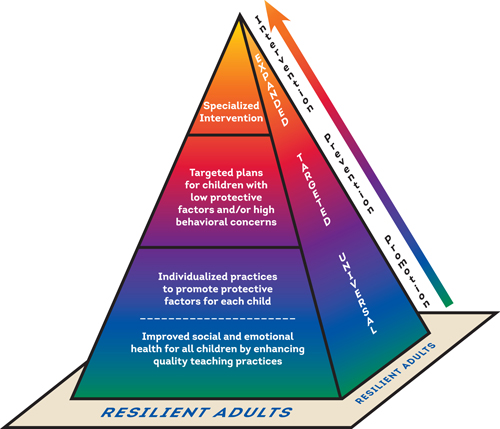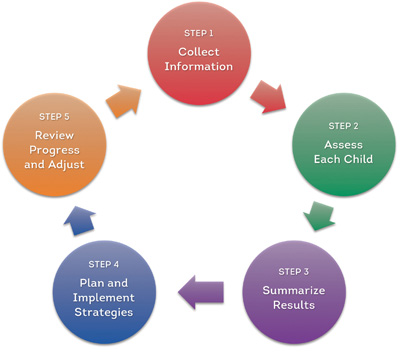Our Approach for Infants & Toddlers

The DCRC approach to fostering resilience in infants and toddlers is a comprehensive assessment and planning process that involves families and professionals working as partners. The significant adults in a child’s life work together to collect information – including social and emotional screening and assessment data – and use the information to develop plans that promote children’s social and emotional skills and resilience. Families, educators, consultants and other significant adult caregivers continuously monitor, evaluate and modify the plans as needed, ensuring positive outomes are achieved for all children.
What we do
DCRC provides strength-based assessments for infants and toddlers:
- Devereux Early Childhood Assessment – Infants (DECA-I), ages 4 weeks up 18 months
- Devereux Early Childhood Assessment – Toddler (DECA-T), ages 18 months up to 36 months
…as well as strategy guides for families, teachers, home visitors, and other adults involved in the lives of children to promote their healthy social and emotional development and resilience.

We also conduct research and advocate on behalf of children, families and child-serving professionals. DCRC provides professional development to help families and professionals use our resources effectively. All of our efforts and resources are based on resilience theory, and help children and adults “bounce back” when faced with adversity. The central concept of our approach is “looking through social and emotional lenses,” which recognizes that social and emotional skills and resilience are best developed through everyday interactions and experiences that are done with awareness and purpose – what is often referred to as mindfulness.
Why we do what we do
DCRC was created out of Devereux Advanced Behavioral Health’s desire to promote the social and emotional well-being of all children. We believe that promoting resilience benefits children, because all children are likely to face adversity at some point in their lives. Even for those children who are already experiencing social and emotional problems, the promotion of their resilience will be essential to their long-term success and happiness.
In order to provide quality, meaningful resources, services and professional development, DCRC has remained true to these six underlying principles:
- The strengths, happiness, and resilience of all children: Children who are happy and have social and emotional strengths are more likely to be academically and socially successful.
- The well-being of the adults who parent, nurture, and educate children: Young children’s healthy social and emotional development is strongly influenced by the health and well-being of the adults who care for them.
- Strength-based approaches: Research confirms that promoting children’s social and emotional strengths reduces the development and escalation of behavioral concerns. DCRC resources identify and build upon children’s strengths first, rather than focusing on the deficit-based behaviors.
- Strong partnerships between families and teachers, and other child-serving professionals: Families and providers working together as a team to provide consistent, nurturing, developmentally appropriate care results in more positive outcomes for children.
- Collaboration between the fields of early childhood and mental health to optimize positive outcomes: Families, providers, specialists, and other community resource professionals share knowledge and work as a team to understand and jointly determine how to best promote children’s healthy social and emotional development.
- Data-driven decision making: Decisions about how to optimize a child’s social and emotional development must be based on reliable and valid information from multiple resources. The DCRC approach uses data to inform decisions and also track progress.
Whom we help through our approach
DCRC’s strength-based approach is prevention-oriented, meaning that it is designed to benefit all children, and the families and adults in their lives. Because all children benefit from strong protective factors, and because a child may face increased risk at any time, DCRC emphasizes the importance of building strong protective factors for all children and adults.
DCRC Model: Tiered Approach to Promoting Resilience in Infants and Toddlers
For those infants and toddlers whose protective factors are typical or strong, Universal strategies appropriate for all children are recommended. Universal strategies are implemented with all children in a group, and include things like:
- Implementing consistent routines and schedules, helping children feel a sense of trust and security in their lives
- Speaking positively, ensuring that babies and toddlers feel care for and loved
- Engaging babies and toddlers in daily routines, such as singing and talking during diaper changes, holding young infants while feeding them, and following a child’s lead during floor time

For children whose protective factors are low, or whose behavioral concerns are high, Targeted strategies are recommended. For these children, Universal strategies are essential, but may not be sufficient to strengthen those protective factors that need additional support. Targeted strategies are focused on the specific needs of the at-risk child, can be implemented in the home and classroom settings, and may include things like:
- Break a task into small steps: Sometimes, a young child will be more successful and will follow directions when an adult helps the child understand and follow each step in a task.
- Provide comfort items that help a child to calm when upset.
- Redirection: When you see a child about to make an inappropriate choice, help them to make a more appropriate choice by redirecting them to another activity.
For those children who have already developed significant behavioral problems, DCRC recommends Expanded strategies, in addition to the Universal and Targeted strategies.
Expanded strategies involve additional professionals with specialized training and skills – like social workers, counselors and speech and language therapists. These infants and toddlers will, of course, benefit from Universal and Targeted strategies, but the services of other, specially trained professionals may also be needed to fully understand and address the children’s needs.
How our approach works
DCRC’s strength-based approach to assessment and planning programs consist of a five-step system to promote healthy social and emotional protective factors in children, in both the home and school settings.
The Five Steps
- Collect information
- Assess each child
- Summarize results
- Develop and implement plans
- Evaluate progress and adjust accordingly

Through these five steps, DCRC’s approach works to assess and build resilience in young children, as well as in the caregivers and in the surrounding environment(s) that impact those children’s lives.
Do YOU want to begin implementing this approach? Check out our various resources and forms of professional development to get started!


